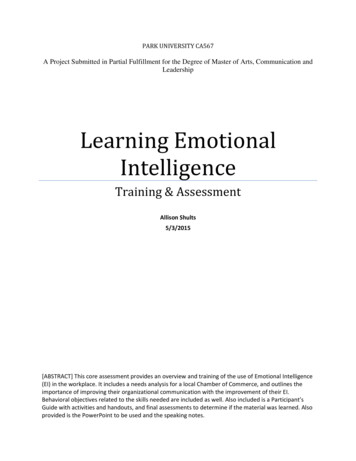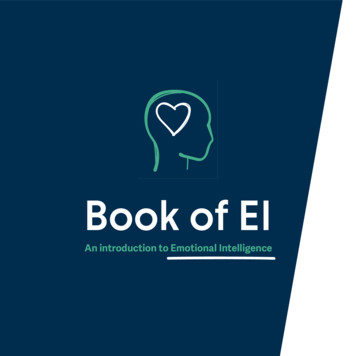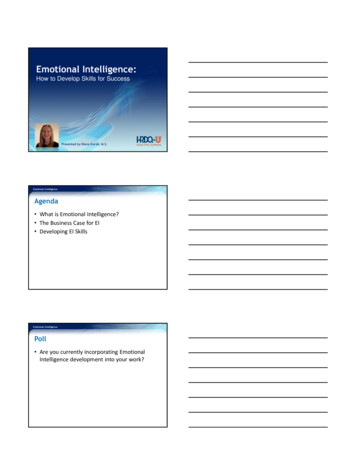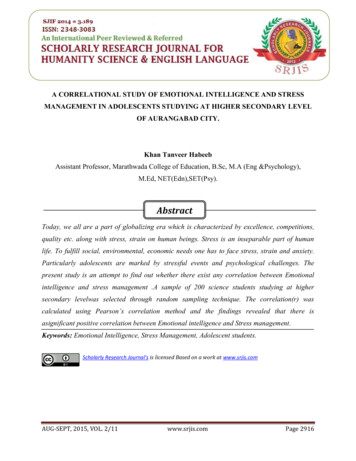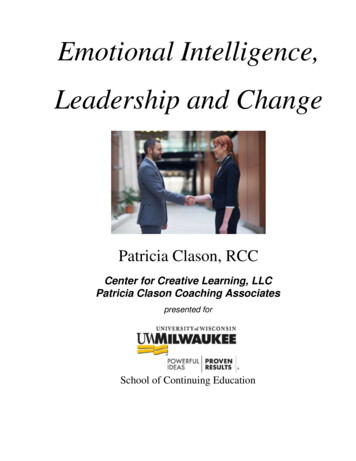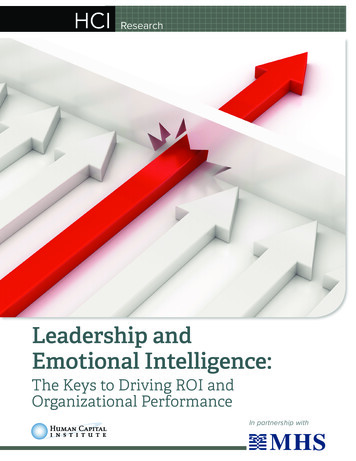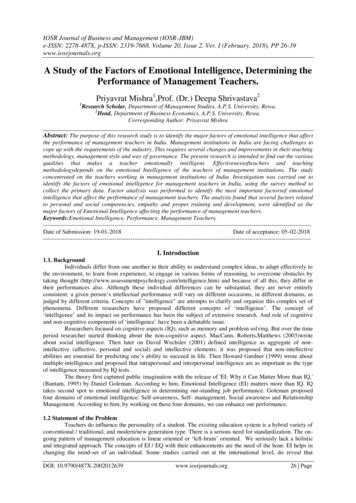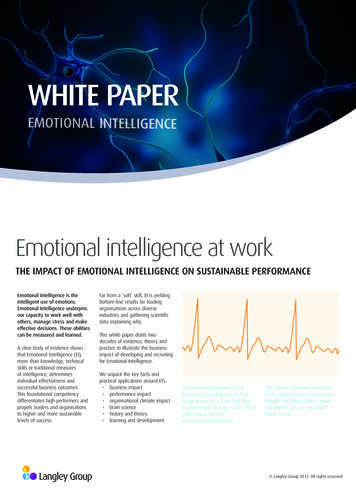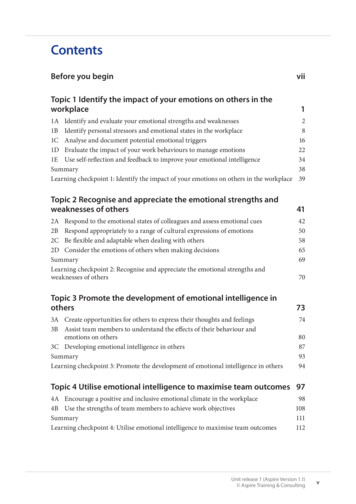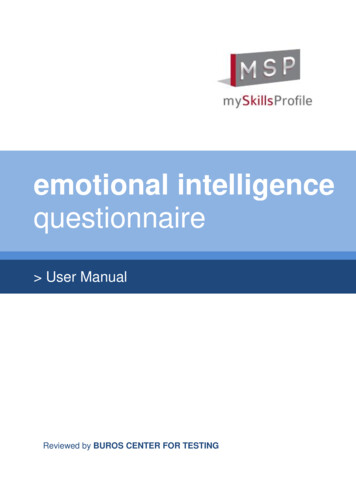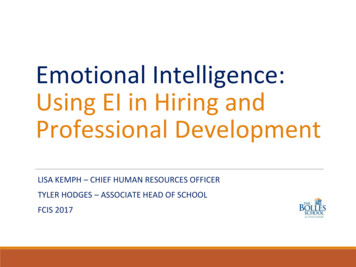
Transcription
Emotional Intelligence:Using EI in Hiring andProfessional DevelopmentLISA KEMPH – CHIEF HUMAN RESOURCES OFFICERTYLER HODGES – ASSOCIATE HEAD OF SCHOOLFCIS 2017
Goals Understand emotional intelligence(EI) and how it relates to success inthe workplace Emotional Intelligence in Hiring Emotional Intelligence inDevelopment
INTRODUCTION TOEMOTIONAL INTELLIGENCE
What is emotional intelligence “A set of emotional and social skills that influencethe way we perceive and express ourselves, developand maintain social relationships, cope withchallenges and use emotional information in aneffective and meaningful way.” -The EQ Edge “The communication between your emotional andrational ‘brains’ is the physical source of emotionalintelligence.” -Emotional Intelligence 2.0
POLL: How important is IQ to yoursuccess?On average, what percentage of workplacesuccess is predicted by IQ?a. 1%b. 6%c. 20%d. 50%
POLL: How important is EQ (EI) to yoursuccess?On average, how much success is due to yourEQ or emotional quotient?a. 5%b. 10%c. 20%d. 30%
IQ versus EQIntelligence Quotient A measure of memory,vocab, math skills,comprehension, abstractand spatial thinking Cognitive abilities IQ is pretty much set Book smarts Can be influenced bygenetics and environmentEmotional Quotient Ability to understand,empathize, and connectwith people Dynamic skills deployedsituationally EQ can be improved Street smarts Cuts across gender gap andtranscends race
Why is this important On average only 20% of workplace success ispredicted by IQ Over 50% of workplace success has beenattributed to EQ Unlike our IQ which is relatively fixed past acertain age, EI can be learned and therefore, EQcan be increased High EQ leads to healthy relationships with others Cultural fit is critical to success Emotional health affects physical health
Why Emotional Intelligence? Schools relationships Identify hires who are open to continuedlearning and growth Model behavior for students Opportunities for immediate & ongoingprofessional growth Build stronger teams Can substantiate observations Always looking to improve
Hiring: What’s the BIG deal? Hiring the best talent; top quality individuals Selecting the best candidate can increaseproductivity and success; reduce learning curve Decreased turnover; cost of turnover can rangefrom 50% to several hundred percent of salary Intangible costs of a bad hire (morale, managingpoor performance, other employee relationsissues) Other costs (e.g., not meeting enrollment targets,fundraising goals, financial metrics)
Comprehensive Hiring Process Interviewing is a useful tool to assist incandidate selection, but it should be used asonly one part of a comprehensive evaluationprocess– Relevant experience and credentials– Reference Checks– Direct observation via classroom instruction,presentations, case studies, and job relatedscenarios– Emotional Intelligence Assessment
Our Hiring ProcessPlanningSourcingSelection Job Description Recruiting Plan Position advertised internally and externally Initial candidate assessment Phone/Skype screenings to narrow talent pool On-campus interviews and assessments EI Assessment administered Reference checks Offer extended
The EQi Model
The EQ-i2.0 modelCopyright (C) 2011 Multi-Health Systems Inc. All rights reserved. Based on the Bar-On EQ-i model by Reuven Bar-On, copyright 1997.copyright 2013, all rights reserved
EI and EducatorsLower School Self-actualization Optimism Stress Tolerance Emotional Selfawareness Problem solving Impulse ControlMiddle/Upper School Self-actualization Optimism Stress Tolerance Emotional Selfawareness Problem solving Flexibility
EMOTIONAL INTELLIGENCEREALMS AND SCALES
SELF PERCEPTION
Emotional self-awareness Ability to recognize emotions as they happen Ability to understand what triggers differentemotions in you – what are your HOTBUTTONS? (and how do you react when theyget activated?) Awareness of how your emotions affectothers Having self-awareness makes the otheremotional intelligence skills much easier touse.copyright 2013, all rights reserved
Self regard Understandingyour strengths andlimitations Accepting yourselfdespite limitations Resultant feelingsof confidencecopyright 2013, all rights reserved
Self actualization Goal oriented Working towardsdesired outcomes Receives satisfactionfrom work Geared to selfimprovementcopyright 2013, all rights reserved
SELF EXPRESSION
Emotional expression (EE) Expressing feelingsverbally & non-verbally Being open andcongruent in theexpression of emotions Effective EE can help tomotivate otherscopyright 2013, all rights reserved
Independence Self-directed Free of emotionaldependency Avoid clinging orneed forreassurance Stand on own twofeetHELP ME!v.I CAN DO ITMYSELF!copyright 2013, all rights reserved
Assertiveness Able to expressthoughts, feelingsand opinionsappropriately Takes up for selfCartoon how notto be assertive!copyright 2013, all rights reserved
INTERPERSONAL
Interpersonal Relationships Degree to which you can have mutualrelationships with others, be appropriatelyvulnerable, share feelings Trust Interactions arerewarding and enjoyablecopyright 2013, all rights reserved
Empathy Show interest in andconcern for others Awareness andunderstanding ofanother’s thoughts,feelings orperspectivescopyright 2013, all rights reserved
Social Responsibility Teamwork andcollaboration Doing your fair share Sense of responsibilityfor others in thecommunitycopyright 2013, all rights reserved
DECISION MAKING
Problem Solving Ability to recognizeand define problemsin situations whereemotions areinvolved Desire to confrontproblems ratherthan avoidcopyright 2013, all rights reserved
Reality testing Ability toaccurately readthe environment,neither over norunder-reacting Curious andexamining ratherthan passive andassumingcopyright 2013, all rights reserved
Impulse control Ability to resist ordelay drives ortemptations Not over-reacting Remaining patientcopyright 2013, all rights reserved
STRESSMANAGEMENT
Stress tolerance Ability towithstandadverseevents andconditionswithout“fallingapart”copyright 2013, all rights reserved
Flexibility Ability to adjustemotions,thoughts andbehaviors to thesituation Accepting changecopyright 2013, all rights reserved
Optimism Tendency to look onthe bright side ofthings Positive attitude Persevere in the faceof adversitycopyright 2013, all rights reserved
GENERAL WELL BEING HAPPINESS– Satisfaction with life– Enjoy the company of others– Pleasant to be with Happiness related to– Self-actualization– Self-regard– Interpersonal Relations– Optimism
PROCESS STEPPlanningTASKHR and/or the Head of School identify and validate a hiring needHR meets with Hiring Manager to discuss required/desired knowledge, skills, education and abilities for the roleHR drafts/edits job description as appropriateHR send final job description to Hiring Manager for approvalHR works with Hiring Manager to determine where best to advertise positionHR and Hiring Manager discuss the hiring process and next stepsPostingHR advertises position through agreed upon sourcesHR posts role in the Applicant Tracking System (ATS)RecruitingHR reviews current resumes on file as appropriate to identify any candidates the School would like to “invite” to apply for the posted roleHR and the Hiring Manager will source candidates through existing networks and direct them to apply if interested via the online applicanttracking systemEvaluationHR will evaluate applicants against established criteria in the job descriptionHR will forward candidates who meet the criteria to the Hiring Manager for reviewHR and/or the Hiring Manager may conduct phone screenings to narrow the applicant pool if necessaryHR will notify applicants who do not meet the established criteriaThe Hiring Manager will notify HR which applicants he/she would like to move forward in the processInterviewsHR will schedule onsite interviews with the selected candidatesHR will work with the Hiring Manager to prepare the interview scheduleHR will work with the Hiring Manager to prepare the Interview GuideHR will ensure all participants in the interview process have copies of the candidates’ resumes and the interview guideHR will notify the selected candidates of the interview process and scheduleHR will make travel arrangements for the candidate(s) if necessaryHR will administer the EQi assessmentThe interview team will conduct the interviewsSelectionThe interview team will evaluate and rank all candidates and make their recommendation to the Hiring Manager and HRHR will score and review the EQi assessment results with Hiring ManagerThe best qualified candidate will be selected for the jobHR will check and verify references, credentials and education as appropriateHR will discuss the total compensation package for the selected candidate with the Head of School and/or Leadership Team memberOfferThe Hiring Manager, HR or the Head of School will verbally make the conditional offerHR will schedule the background check/drug screenHR will prepare the offer letter and new hire welcome packet (including benefits information) and deliver to the successful candidate via email, US mail, or in personClose postingThe Head of School, HR and/or Hiring Manager will notify candidates not selectedThe Interview Team will ensure HR has all interview notes and documentation for the fileHR will complete any required applicant tracking documentation
People with well-developed emotional skillsare . more likely to be content and effectivein their lives, mastering the habits of the mindthat foster their own productivity; people whocannot marshal some control over theiremotional life fight battles that sabotage theirability for focused work and clear thought.— Daniel Goleman, "Emotional Intelligence“https://youtu.be/auXNnTmhHsk
References Stein, S. J. & Book, H. (2011). The EQ Edge:Emotional Intelligence and Your Success.Wiley: Ontario, Canada. Bradberry, Travis & Greaves, Jean (2009).Emotional Intelligence 2.0. TalentSmart: SanDiego, CA.
What is emotional intelligence "A set of emotional and social skills that influence the way we perceive and express ourselves, develop and maintain social relationships, cope with challenges and use emotional information in an effective and meaningful way." -The EQ Edge "The communication between your emotional and
